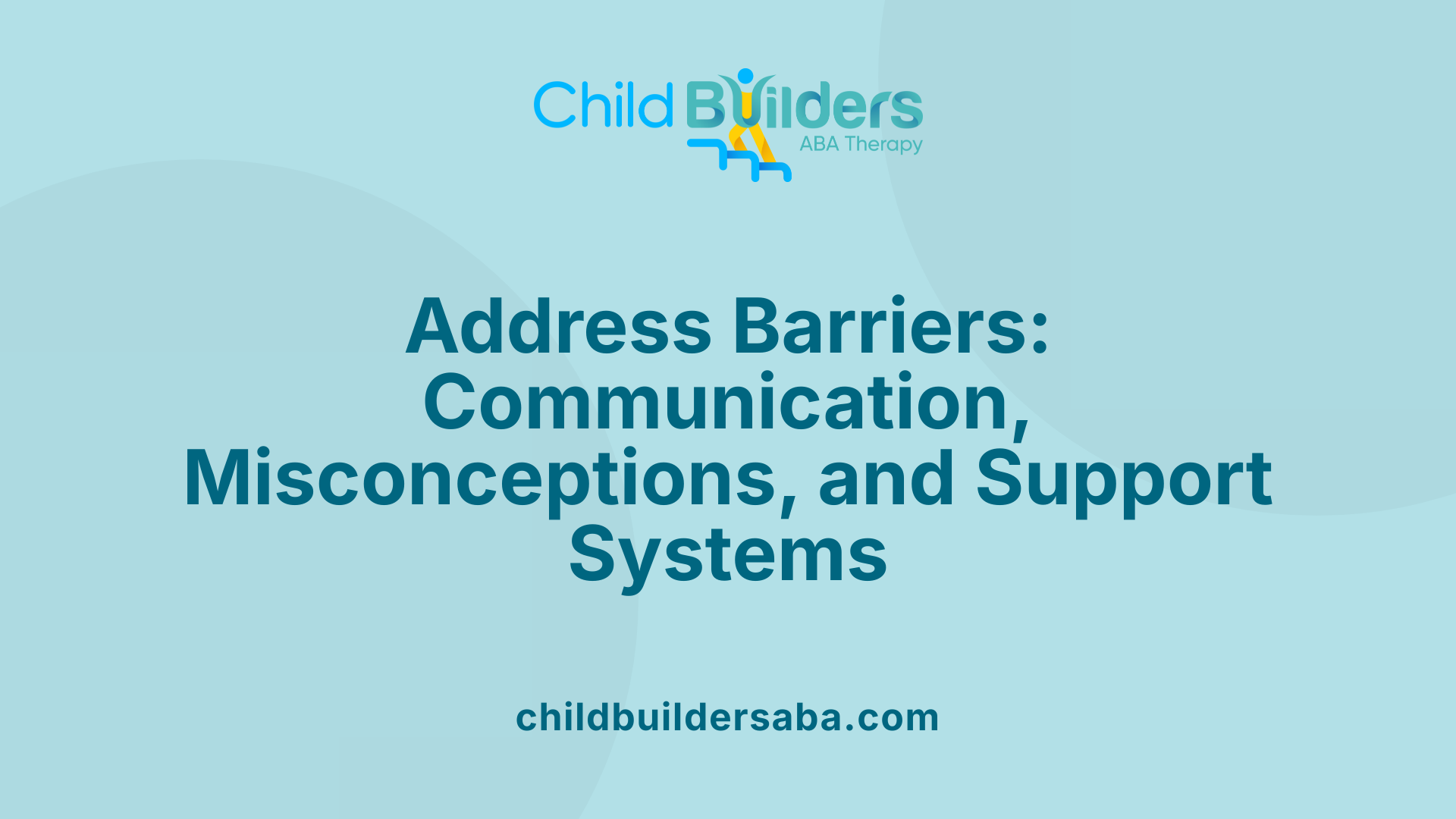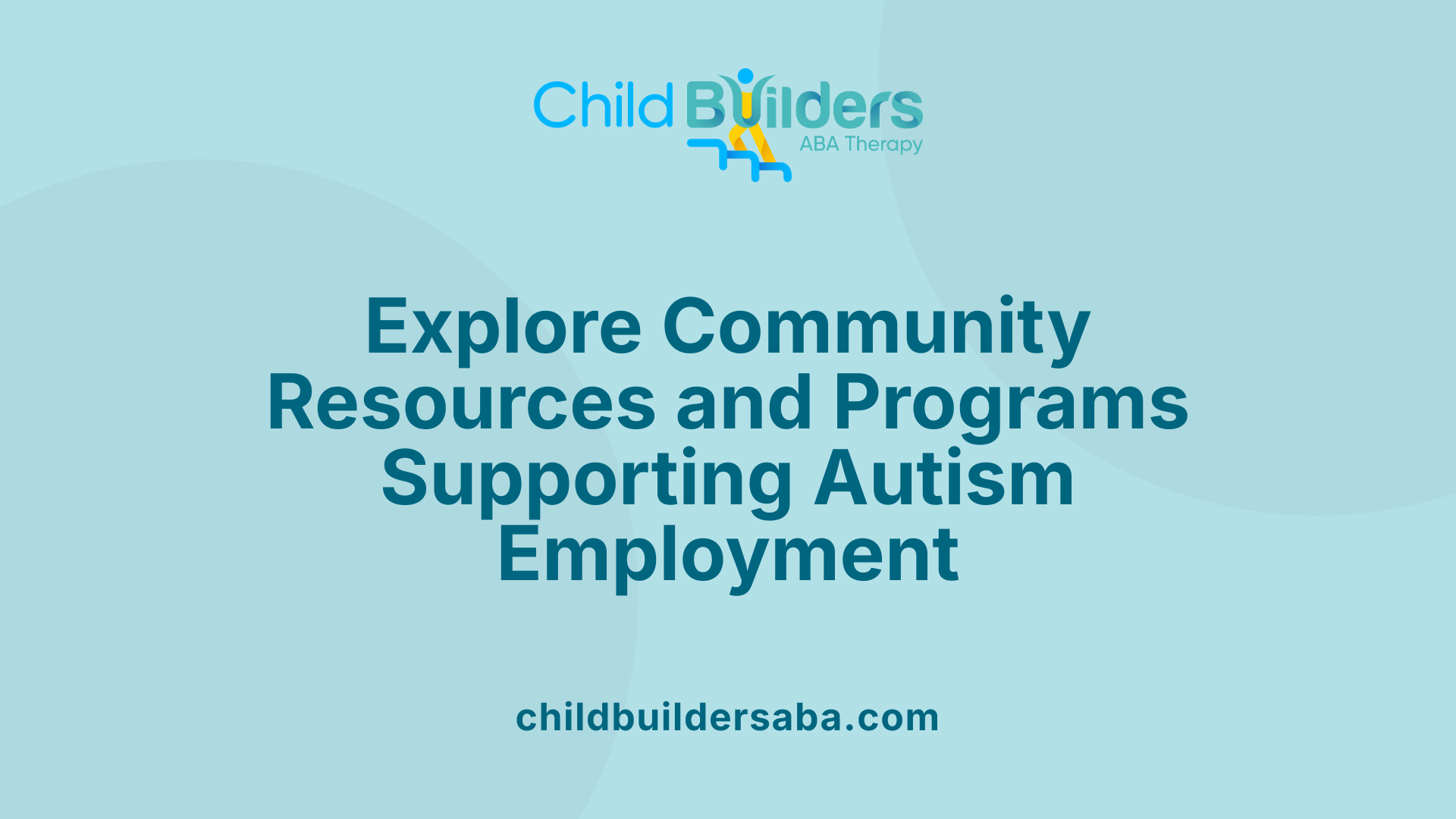Jobs for People on the Autism Spectrum

Opening Doors: The Path to Meaningful Work for Autistic Adults
Despite remarkable strengths and talents, many autistic adults face significant barriers to employment. Understanding the resources, strategies, and inclusive practices available is essential to bridge this gap and create supportive work environments where autistic individuals can thrive.
Understanding Employment Challenges for Autistic Adults

Why are a large percentage of autistic adults unemployed?
A significant portion of autistic adults face unemployment or underemployment, often due to complex and interconnected reasons. Many traditional workplaces are not fully equipped to meet the needs of neurodiverse employees, lacking sufficient awareness or accommodations that could facilitate success.
Communication difficulties and social interaction challenges can make it hard for autistic individuals to navigate typical workplace environments. This can affect teamwork, performance reviews, and relationship building with colleagues.
Discrimination and misconceptions about autism further complicate employment prospects. Biases may influence hiring decisions, or employers might underestimate the capabilities of autistic candidates.
Furthermore, gaps in specialized education, vocational training, and mental health support limit access to sustainable employment opportunities. Programs focusing on autism-specific job training, supported employment services, and workplace inclusion initiatives are essential to bridge these gaps.
Overall, addressing these barriers involves fostering inclusive workplace cultures, providing appropriate accommodations, and increasing awareness about the diverse talents and needs of autistic adults.
Effective Career Paths and Employment Strategies
What are some effective employment strategies and career options for autistic adults?
Empowering autistic adults in the workforce begins with understanding individual strengths and interests. Tailored employment strategies emphasize the importance of matching skills with suitable job roles. Many find success in careers that offer structure, routine, and independence—such as data analysis, software development, librarian roles, graphic design, and laboratory technician positions. These roles leverage attention to detail, logical thinking, and pattern recognition.
Seeking autism-friendly employers also plays a crucial part. Companies that embrace inclusive practices, provide workplace accommodations, and foster understanding environments enhance job retention and satisfaction. Such accommodations might include sensory-friendly workspaces, flexible schedules, and clear communication protocols.
Support services like vocational rehabilitation programs and specialized job placement services are valuable resources. They assist in navigating career options, applying for supportive benefits, and connecting with employers committed to neurodiversity.
Creating a welcoming work environment is equally vital. Training staff and managers on autism awareness, establishing explicit routines, and providing clear instructions contribute to a supportive atmosphere. These measures enable autistic adults to thrive, remain engaged, and achieve career fulfillment.
In essence, adopting a holistic approach that combines individual strengths, reasonable workplace adjustments, and an inclusive culture maximizes employment success for autistic adults. This approach not only benefits individuals but also enriches organizations through diverse perspectives and dedicated employees.
Resources to Support Job Seekers with Autism

What organizations and programs facilitate employment for autistic adults?
Various organizations and government programs provide employment support specifically tailored for autistic adults. The Texas Autism Society offers employment resources and runs programs like Autism Assets @ Work in Austin, aimed at connecting autistic individuals with job opportunities and support.
Statewide, the Texas Workforce Commission provides vocational rehabilitation programs that assist individuals with disabilities in preparing for, finding, and maintaining employment. The Arc of the Capital Area operates an Autism employment program, and its initiative, Arc@Work, features tools like Talent Scout to help employers hire, train, and retain employees on the autism spectrum.
Nationally, initiatives like Autism Speaks’ Workplace Inclusion NowTM and TheSpectrumCareers website offer job listings, employment toolkits, and resources to both job seekers and employers. Federal programs such as Ticket to Work, Job Accommodation Network (JAN), and the Workforce Innovation & Opportunity Act (WIOA) play a crucial role by offering training, accommodations, and support aimed at increasing employment opportunities for individuals with autism.
Numerous private organizations, including Aspire’s career services, auticon, and Autism2Work, specialize in job placement and training for autistic adults. Many companies, such as Microsoft, Google Cloud, and JPMorgan Chase, have established inclusive hiring initiatives, recognizing the benefits of neurodiversity in the workplace.
What job search techniques and tools can help autistic individuals find employment?
Autistic job seekers are encouraged to leverage a variety of strategies during their search. Creating a clear list of personal strengths, skills, and future career interests can help in tailoring resumes and practicing interview skills. Utilizing online platforms such as social networking sites, job boards, and specialized career websites like TheSpectrumCareers can increase visibility to potential employers.
Networking remains vital; joining community groups, attending job fairs, and engaging with organizations that advocate for autism employment support can open doors. Many resources also include practical guides for building resumes, navigating job applications, and understanding employment rights and accommodations.
Furthermore, gaining work experience through volunteering, internships, or apprenticeships provides valuable skills and boosts confidence. Engaging with vocational training programs helps enhance specific competencies aligned with personal interests and abilities.
What support services and vocational training programs are available?
Support services such as the Office of Vocational Rehabilitation and supported employment agencies are instrumental in helping autistic adults transition into the workforce. Programs like Autism Assets @ Work, Spectrum Works, and specialized job coaching services facilitate skill development, job placement, and ongoing support.
Many organizations offer training courses focusing on workplace skills and self-advocacy, such as Autism Speaks’ training in workplace communication and navigating differences. These programs promote understanding and inclusivity, encouraging employers to adapt workplaces to meet the needs of neurodiverse employees.
Community-based initiatives often emphasize creating calm, structured environments with clear communication and support networks. This approach fosters successful employment outcomes, helping autistic individuals find careers that match their strengths and interests.
| Organization/Program | Focus Area | Notable Features |
|---|---|---|
| Texas Autism Society | Employment resources, local programs | Autism Assets @ Work in Austin |
| Texas Workforce Commission | Vocational rehabilitation | statewide support for job preparation |
| Autism Speaks | Employers and job seekers | Workplace Inclusion Now, TheSpectrumCareers website |
| Spectrum Works | Job training, supported employment | Partnered with over 16 companies, trained 600+ individuals |
| Aspire Career Services | Job placement, training | Community-based programs |
| auticon US | Technology consulting for autistic adults | Employment opportunities in tech |
| auticon US | Technology consulting for autistic adults | Employment opportunities in tech |
Employers are increasingly recognizing the value of neurodiverse workers. Implementing inclusive hiring practices, offering workplace accommodations, and fostering understanding through training are essential steps. Many organizations also suggest that jobs involving technology, animal care, skilled trades, or quiet environments are well-suited for autistic adults.
In summary, a mixture of community resources, targeted employment programs, training, and innovative hiring practices create more opportunities and support pathways for autistic adults seeking employment. This integrated approach helps foster inclusive workplaces where individuals on the spectrum can thrive and contribute meaningfully.
Specialized Programs and Initiatives for Autonomous Employment Growth
Are there specialized employment programs or initiatives aimed at supporting autistic adults?
Yes, numerous programs and initiatives are dedicated to enhancing employment opportunities for autistic adults. Several organizations and companies have launched targeted efforts to support neurodiverse workers.
The Autism Society offers employment resources and runs initiatives like Autism Assets @ Work in Austin, facilitating connections between autistic adults and employers. Autism Speaks provides a comprehensive career website, TheSpectrumCareers, featuring hundreds of job postings tailored to autistic job seekers. They also promote workplace inclusion through programs like Workplace Inclusion NowTM, designed to bridge autistic individuals and prospective employers.
Major corporations recognize the value of including neurodivergent employees. Companies such as JPMorgan Chase, Microsoft, SAP, Google Cloud, and Ford have established autism-specific hiring pilots and inclusive workplace programs. These initiatives include tailored training, mentorship, and workplace accommodations aimed at resolving systemic barriers.
Supported employment models—like supported employment, job coaching, and personalized job matching—are prominently used across these programs. These models help autistic employees succeed by offering ongoing support, adapting job roles, and fostering inclusive environments.
Apart from corporate efforts, government agencies play a significant role. The Texas Workforce Commission provides statewide vocational rehabilitation programs, while initiatives under the Workforce Innovation & Opportunity Act facilitate job training and placement. The Office of Vocational Rehabilitation and programs like Ticket to Work help individuals transition into sustainable careers.
Several specialized organizations focus on skill development and community-based employment for adults with autism. Nonprofits such as Aspiritech, auticon US, Autism2Work, and Spectrum Works train individuals in technology, research, and skilled trades. These programs emphasize the importance of structured work environments, necessary accommodations, and ongoing coaching.
Together, these diverse programs create a robust network of support, improving employment rates among autistic adults. They aim to build workplaces that value neurodiversity, practice inclusive hiring, and foster long-term career growth. Efforts continue to evolve, incorporating feedback from autistic workers to tailor solutions that enable meaningful employment and personal fulfillment.
| Organization/Program | Focus Area | Notable Achievements |
|---|---|---|
| Autism Society | Resources & Advocacy | Connects employers and autistic job seekers, promotes inclusive practices |
| Spectrum Works | Job Training & Placement | Over 600 trained, partnered with 16+ companies to enhance employment |
| auticon US | Technology Consulting | Employs autistic adults as IT consultants, focusing on skills and support |
| Autism Speaks | Career Website | Hosts over 400 jobs for autistic job seekers, provides job readiness resources |
| JPMorgan Chase, Microsoft, SAP | Corporate Initiatives | Autism hiring pilots, workplace diversity programs |
These concerted efforts across organizations, government agencies, and corporations highlight a growing recognition of the strengths and potential of autistic workers. They contribute to a more inclusive labor market where diversity is seen as a valuable asset.”}}#}#}#}#}#}#}#}#}#}#}#}#}#}#}#}#}#}#}#}#}#}#}#}#}#}#}#}#}#}#}#}#}#}#}#}#}#}#}#}#}#}#}#}#}#}#}#}#}#}#}#}#}#}#}#}#}
Workplace Accommodations Enhancing Productivity and Wellbeing
What types of workplace accommodations and support can benefit autistic employees?
Creating a supportive work environment for autistic employees involves implementing various accommodations that address sensory sensitivities, communication preferences, and the need for structure.
Sensory modifications are a common approach. These can include providing dimmer lighting options, noise-canceling headphones, and creating quiet or sensory-friendly areas within the workplace. Such adjustments help reduce overstimulation and create a more comfortable environment for autistic workers.
Effective communication strategies are vital. Using clear, direct language, providing written instructions, visual aids, and avoiding subtle cues or subtext ensures that information is understood accurately. These methods help minimize misunderstandings and improve interactions with colleagues and supervisors.
Flexibility in work arrangements is another critical support. Allowing employees to adjust their schedules, offer remote work options, and modify break times can help manage sensory overload and stress. This flexibility empowers autistic workers to perform at their best without feeling overwhelmed.
Organizational supports extend beyond physical accommodations. Establishing structured routines, providing advance notice of any changes, and offering job coaching or mentorship can significantly enhance job retention and satisfaction. These supports foster confidence and a sense of stability.
Furthermore, ongoing training for managers and coworkers about autism awareness and inclusive practices helps cultivate an understanding and accepting workplace culture. Regular follow-up and feedback from autistic employees ensure that accommodations are effective and adapt to evolving needs.
Implementing these accommodations and supports builds a more inclusive environment, enabling autistic workers to thrive professionally while maintaining their wellbeing.
Building Inclusive Work Environments and Cultivating Acceptance

The importance of inclusive cultures
Creating workplaces that celebrate neurodiversity is essential for supporting autistic employees. An inclusive environment helps reduce stigma, fosters understanding, and enables individuals on the autism spectrum to thrive. Companies that prioritize acceptance often see improved employee engagement, reputation, and diversity.
Training programs for staff and management
Implementing specialized training programs is vital for educating staff and managers about autism. These programs can cover topics like effective communication, workplace accommodations, and understanding autistic strengths. Initiatives such as Autism Speaks' Workplace Inclusion Now™ help foster awareness, empathy, and skill development among team members.
Legal and ethical considerations
Employers must adhere to federal laws such as the Americans with Disabilities Act (ADA), which requires reasonable accommodations for employees with disabilities. Ethical practices include maintaining confidentiality, providing accommodations like quiet work areas, flexible hours, and clear communication channels. Supporting neurodiverse employees not only aligns with legal standards but also enhances an ethical, respectful workplace culture.
| Aspect | Description | Additional Notes |
|---|---|---|
| Inclusion | Foster acceptance and value diverse neurotypes | Improves morale and retention |
| Training | Educate about autism spectrum traits and accommodations | Essential for effective support |
| Legal Rights | Comply with ADA and other relevant laws | Ensures fair treatment |
Building workplaces that are truly inclusive requires ongoing effort and commitment. When organizations actively cultivate acceptance through education, respectful policies, and accommodations, they create environments where autistic employees can excel and contribute fully.
The Role of Self-Employment and Freelance Opportunities

Advantages of autonomous work
For many autistic adults, self-employment and freelance work offer significant benefits. These options allow individuals to control their work environment, set their own schedules, and choose projects aligned with their interests and strengths.
Autonomous work can reduce the stress associated with traditional office settings, such as social interactions and strict routines. It promotes independence and flexibility, which are highly valued by those on the autism spectrum. Many find that self-employment provides a sense of mastery and purpose, leading to increased job satisfaction.
Additionally, freelancing opens doors to a variety of careers, including arts, crafting, consulting, and technology. These roles often require only minimal social interaction, making them suitable for autistic individuals seeking a calm and predictable work environment.
Research into self-employment for autistic adults highlights its potential to improve employment stability, foster skill development, and enhance overall well-being. It is increasingly viewed as a viable and empowering pathway to meaningful careers for many on the spectrum.
Personalizing Career Choices Based on Interests and Strengths

Tips for self-assessment and exploration
Autistic adults can start by analyzing their own strengths and preferences. Creating lists of skills, such as attention to detail or logical thinking, helps identify suitable jobs. Exploring different professional environments, like volunteering or internships, offers insight into what feels comfortable.
Matching skills to career paths
Certain careers align with common autistic strengths—such as technology, animal care, or creative arts. For example, roles like software development, veterinary technician, or graphic design leverage skills like pattern recognition, patience, and artistic talent. Utilizing existing resources like employment toolkits and self-assessment guides can help narrow down options.
The importance of personal interests
Choosing a career connected to personal passions boosts job satisfaction and success. Whether driven by a love of nature, crafts, or technology, aligning work with interests fosters engagement and reduces stress. Considering flexible or self-employment options may also provide autonomy and a comfortable work environment.
Creating a Bright Future for Autistic Workers
Supporting autistic adults in finding and maintaining meaningful employment requires a collaborative effort among employers, community organizations, and policy makers. By fostering inclusive environments, providing tailored accommodations, and promoting awareness and acceptance, society can harness the unique talents of autistic individuals. These strategies not only enhance personal fulfillment and community participation for autistic workers but also contribute to diverse, innovative, and productive workplaces. The future of employment for autistic adults is promising when driven by understanding, support, and commitment to inclusion.
References
- Employment & Employer Resources - Autism Society of Texas
- Employment Resources for Autism - Websites and Program | IACC
- 27 Companies Who Hire Adults With Autism | Workology
- Tips for autistic job seekers to find the right job | Autism Speaks
- Employment | Autism Society
- Manageable jobs for autistic people - Autistic adults - Home
- what type of jobs are good for people with autism? - Career Village
- 30 Great Jobs for People on the Autism Spectrum
- Employment Information for Individuals with Autism - PAAutism.org

























.jpg)











































































